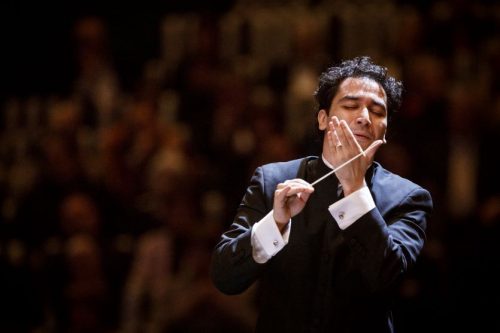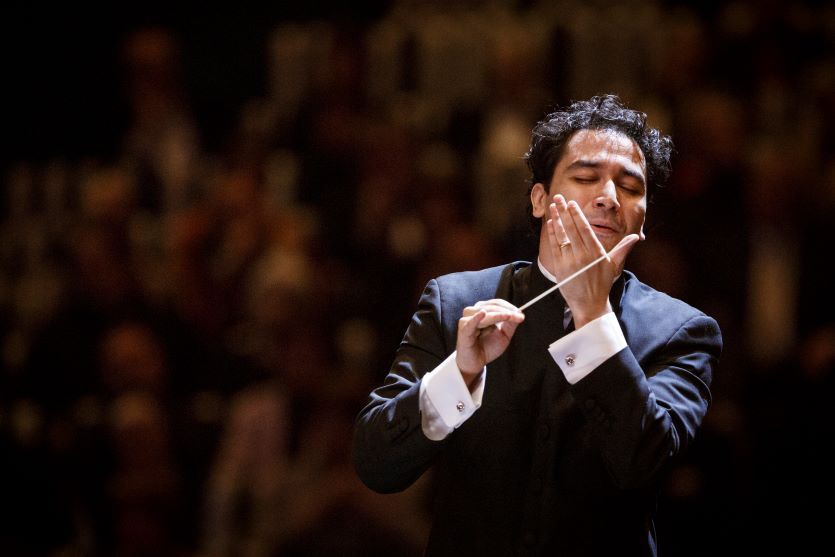 Germany Mussorgsky, Prokofiev, Stravinsky: Anna Vinnitskaya (piano), Staatskapelle Dresden / Andrés Orozco-Estrada, Semperoper, Dresden, 11.6.2019. (MC)
Germany Mussorgsky, Prokofiev, Stravinsky: Anna Vinnitskaya (piano), Staatskapelle Dresden / Andrés Orozco-Estrada, Semperoper, Dresden, 11.6.2019. (MC)

Mussorgsky – Night on Bald Mountain (orch. Rimsky-Korsakov)
Prokofiev – Piano Concerto No.2, Op.16
Stravinsky – The Rite of Spring (rev. 1947)
For its ‘Symphony Concert No.11’ of the season the selected a Russian themed programme. Subtitled ‘Russian Dance Scenes’ two spectacular and colourful masterpieces from Mussorgsky and Stravinsky, connected to the medium of dance, bookended a technically intimidating piano concerto from Prokofiev.
On his return to conduct the Staatskapelle Dresden, Columbian born Andrés Orozco-Estrada opened the concert with Mussorgsky’s tone poem Night on Bald Mountain. Described by the composer as ‘musical picture’ the score was performed in the more usually heard re-orchestration prepared by Rimsky-Korsakov. Mussorgsky and Rimsky-Korsakov were contemporaries and also friends who at one time shared an apartment in St Petersburg. It was five years after Mussorgsky’s death when Rimsky-Korsakov conducted the first performance of his re-orchestration of the score. The tone-poem, a dance scene of witches’ Sabbath on St. John’s Eve, became famous when used in Walt Disney’s Fantasia (1940) in a version specially prepared for the soundtrack by Leopold Stokowski. Orozco-Estrada ensured a solid and spirited performance of real character with lots of orchestral colour, eschewing the hell for leather impetuosity of some performances I have encountered.
Of Prokofiev’s piano concertos it is the Third that gets the lion’s share of the attention followed by the Second which was played here by soloist Russian pianist Anna Vinnitskaya who has been successful in building on the prize-winning prowess of her early career. Prokofiev wrote his Second Piano Concerto in 1913 whilst a student at the St Petersburg Conservatory but for his graduation piece as a piano student he chose to perform his First Piano Concerto, which won him the Rubinstein Prize. Prokofiev considered his Second Piano Concerto as far too modern for the conservative Conservatory judges. Amid the mayhem of the Russian Revolution the concerto was destroyed so some years later in 1923 Prokofiev extensively reconstructed and revised the score. Certainly, a work close to her heart Vinnitskaya played this at the prestigious Queen Elisabeth Competition, Brussels (2007) where she won first prize, later recording the work on the Naïve label. A most expressive performer at the keyboard and striking in this formidable concerto, Vinnitskaya’s pulsating playing on her Steinway had me captivated from start to finish. Standing out was the scorching performance of the opening movement Andantino-Allegretto with its extended cadenza which was given a display nothing short of dazzling. In place of a traditional slow movement the rapidly paced Intermezzo was fraught with menace. Memorable was the percussive nature of Vinnitskaya’s electrifying playing combining with the orchestra for a volume of considerable impact.
Stravinsky was at the vanguard of the new dawn in the evolution of symphonic ballet. The notorious 1913 première of Stravinsky’s seminal work The Rite of Spring at the Théâtre des Champs-Élysées, Paris drew worldwide attention to what is now one of the most admired and popular of all 20th-century scores. In my view significant impact is lost by not seeing the actual ballet but nevertheless it is certainly a work I relish hearing performed and here Orozco-Estrada was conducting the 1947 revision of the score. In this impressively conceived performance from the Staatskapelle Dresden under Orozco-Estrada especially impressive was the unified and brilliant playing. I might have heard performances with greater barbaric outbursts of toxic aggression, but few were as riveting, as highly charged with tension and with such a dazzling array of colourful sounds ranging from earthy to exotically perfumed. Led impeccably by concertmaster Matthias Wollong there were far too many exceptional individual contributions to mention in this outstanding ensemble performance.
During the enthusiastic applause at the end of the concert Andrés Orozco-Estrada respectfully focused the attention on percussionist Bernhard Schmidt who was retiring from the Staatskapelle Dresden after forty-five years service.
Michael Cookson
